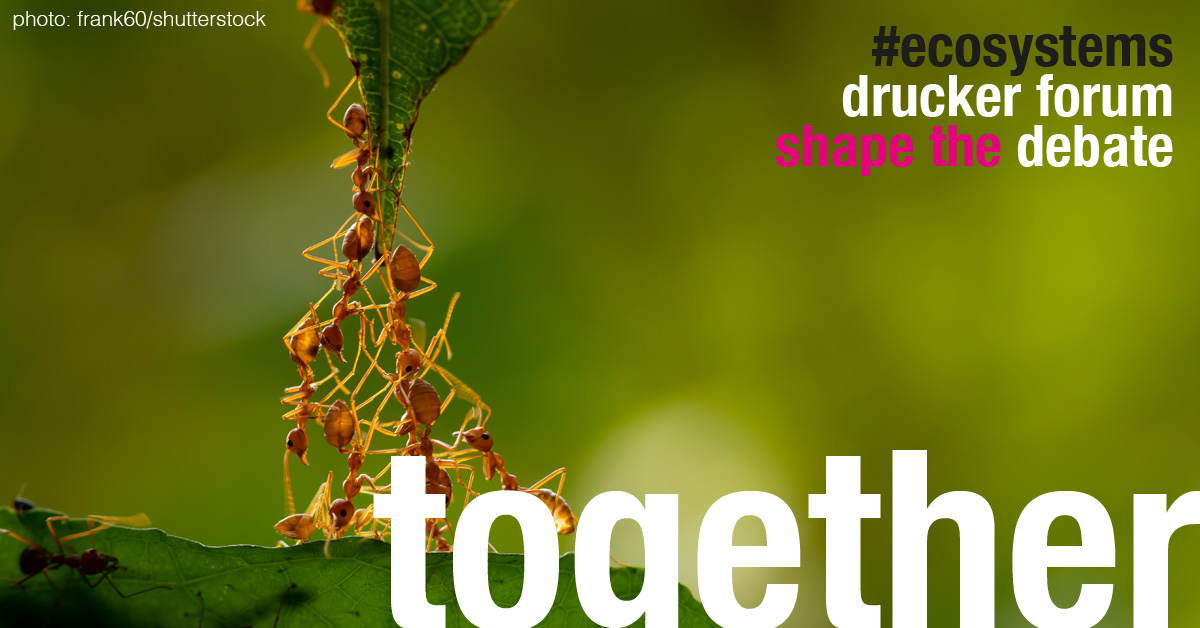
“In the long history of humankind, those who learned to collaborate and improvise most effectively have prevailed.” Charles Darwin
Drucker Forum 2019
Ants have been living on this earth for millions of years – and the key to their long survival comes from their being part of an ecosystem and not acting as lone fighters. All ecosystem members are connected to and dependent on each other. Collaboration and combining individual competencies are the ants’ secret recipe for acting efficiently and adaptively. A great approach not only for ants, but also for businesses. So, what can we learn?
Self-organization is key
Ants are team players, and the contribution of each one counts. They organize themselves by continuous communication. Without instruction they automatically distribute tasks and get them done. This allows them to master complex tasks like nest construction and tackle seemingly impossible challenges like transporting huge objects for the good of the colony.
Our research shows that 71% of organizations observe teams being challenged by managing themselves. Ants display beautifully how to achieve self-organization: they know the objective, they adapt proactively and do everything that is required to complete the tasks – without waiting for supervisors’ instructions – and they communicate with each other to seek the support of the team to solve a challenge they encounter and to pass on the knowledge to others to be faster in the completion of the task. A sequence of three simple steps to be successful.
Job distribution and matching skills
Ants have clear roles to ensure a smoothly running system. The queen spends her life laying eggs, whereas the workers go through a sequential career of brood care, cleaning and food collection. Each ant passes through these different roles in their “career” as soon as their skills are ready. For competency development, they build a culture of knowledge sharing and experimentation.
Capgemini Invent’s Talent Gap Study showed that organizations are not doing enough to build up required competencies for their future. Inspired by ants, organizations need to define transparent career paths and build capabilities accordingly. Providing peer-to-peer learning opportunities paired with a knowledge sharing are indicators for success.
Testing and co-creation drive successful innovation
Ants are inventive. They experiment with tools to transport food. Following a trial-and-error-approach, they test everything at their disposal. They share insights within their colony to find the best method, which is frequently evaluated and adapted to new learnings.
Today, only 37% of employees perceive their organization as having a culture of innovation, experimentation and risk-taking. Ants show that successfully innovating only works with the right mindset, the power of the group and co-creation. They work in their swarms together – without any silo thinking or resistance to positive change. Independent of their roles, each one is contributing to the next innovative idea, e.g. to increase their efficiency in finding and transporting food.
All in all: if you want to go far, go together. Look to the ants!
About the Author:
Claudia Crummenerl is Managing Director, Global Practice Lead People and Organization at Capgemini Invent @kurachan_1001
This article is one in the Drucker Forum “shape the debate” series relating to the 11th Global Peter Drucker Forum, under the theme “The Power of Ecosystems”, taking place on November 21-22, 2019 in Vienna, Austria #GPDF19 #ecosystems

